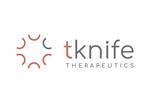T-knife Therapeutics, Inc., a biopharmaceutical company dedicated to developing novel therapeutics to fight cancer, reported preclinical data demonstrating that its novel MAGE-A1-specific T cell receptor (TCR) induced meaningful anti-tumor activity and enhanced engraftment as compared to human donor derived TCRs. In vivo data presented at the SITC annual meeting highlight the potential of T-knife’s lead product candidate TK-8001.
- Preclinical, Translational and Clinical Trial Posters for TK-8001 Presented at the Society for Immunotherapy of Cancer (SITC) 36th Annual Meeting
- Plan to initiate a first-in-human, Phase 1/2 Trial in Early 2022
SAN FRANCISCO, Nov. 15, 2021 (GLOBE NEWSWIRE) -- T-knife Therapeutics, Inc., a biopharmaceutical company dedicated to developing novel therapeutics to fight cancer, reported preclinical data demonstrating that its novel MAGE-A1-specific T cell receptor (TCR) induced meaningful anti-tumor activity and enhanced engraftment as compared to human donor derived TCRs. In vivo data presented at the SITC annual meeting highlight the potential of T-knife’s lead product candidate TK-8001, a TCR engineered T cell therapy (TCR-T) that is being developed to treat MAGE-A1 positive solid tumors. The company plans to initiate a first-in-human, Phase 1/2 trial in early 2022.
T-knife has used its proprietary HuTCR platform to discover multiple naturally optimized high-affinity TCRs specific for the cancer-testis antigen MAGE-A1. These MAGE-A1-specific TCRs were isolated from the HuTCR platform and in vitro and in vivo activity were compared to different human-derived MAGE-A1-specific TCRs. T-knife’s TCRs, including the TCR incorporated in TK-8001, were found to be of higher affinity than human derived TCRs and resulted in superior anti-tumor activity, as shown in a syngeneic preclinical model. In addition, TK-8001 exhibited enhanced engraftment rates, as measured by TCR+ cells in peripheral blood. The data generated in these preclinical evaluations highlight the potential therapeutic benefit of TK-8001.
In a separate trial-in-progress poster at the conference, the company provided detail on its planned IMAG1NE Phase 1/2 trial of TK-8001 to evaluate the safety, tolerability, and clinical activity of TK-8001 in advanced-stage, metastatic, MAGE-A1 positive solid tumors. The trial will be conducted in two phases, including a dose escalation phase designed to select the optimal dose to be utilized in a subsequent open-label expansion cohort. A supporting translational poster validating MAGE-A1 as an attractive solid tumor target was also presented.
“It is gratifying for our R&D team to present this exciting preclinical efficacy data in solid tumors expressing MAGE-A1,” said Elisa Kieback, Ph.D., founder and Chief Technical Officer of T-knife Therapeutics. “Advancing this program toward the clinic and clinical proof of concept for our TCR platform is an important corporate milestone and highlights the substantial progress we have been making over the past year. We look forward to generating clinical data with TK-8001 with the initiation of our IMAG1NE Phase 1/2 study in select patients with MAGE-A1 expressing solid tumors.”
About TK-8001 TCR-T
TK-8001 is a CD8 TCR-T specific for the Melanoma-associated Antigen Gene-A1, or MAGE-A1. MAGE-A1 is associated with hallmarks of aggressive cancers and poor clinical prognosis, and there is an emerging body of evidence indicating its involvement as a potential driver of tumorigenesis. MAGE-A1 represents an attractive therapeutic target given the high unmet need in MAGE-A1 expressing cancers, no reported protein expression in healthy tissues other than testis and significant consistency of expression between the primary tumor and metastases. As high affinity TCRs specific for MAGE-A1 peptides in humans are eliminated through central tolerance, we believe our HuTCR platform is a differentiated means to discover and select MAGE-A1 specific TCRs with an optimal affinity and high specificity profile.
About the IMAG1NE Phase 1/2 Trial
The IMAG1NE Phase 1/2 trial is an open-label, multi-center Phase 1/2 trial designed to evaluate the safety and efficacy of TK-8001 in patients with MAGE-A1 positive solid tumors. The first phase of the IMAG1NE trial is planned to enroll approximately 6 to 18 patients to assess the initial safety and tolerability of ascending dose levels of TK-8001. A key outcome of the first phase of the trial is to select a dose to be evaluated in an open label expansion phase of the study. The open label expansion phase of the IMAG1NE trial is designed to enroll approximately 30 additional participants to assess the efficacy of TK-8001 across a range of tumor indications.
About T-knife Therapeutics
T-knife Therapeutics is a biopharmaceutical company dedicated to developing novel therapeutics to fight cancer, initially focused on T cell receptor (TCR) engineered T cell therapies (TCR-Ts), a modality that holds the potential to generate transformative responses in patients with solid tumors. The Company’s unique approach leverages its proprietary HuTCR mouse platform, a next-generation T cell receptor and epitope discovery engine that produces fully human, tumor-specific TCRs, naturally selected in vivo for optimal affinity and high specificity.
T-knife is advancing a portfolio of TCR-T product candidates against targets with high unmet medical need, including cancer testis antigens, oncoviral antigens and commonly shared tumor-driving neoantigens. T-knife was founded by leading T-cell and immunology experts using technology developed at the Max Delbruck Center for Molecular Medicine together with Charité – Universitätsmedizin Berlin. For additional information, please visit the company’s website at www.t-knife.com.
T-knife Therapeutics, Inc.
Camille Landis
Chief Business Officer / Chief Financial Officer
media@t-knife.com






